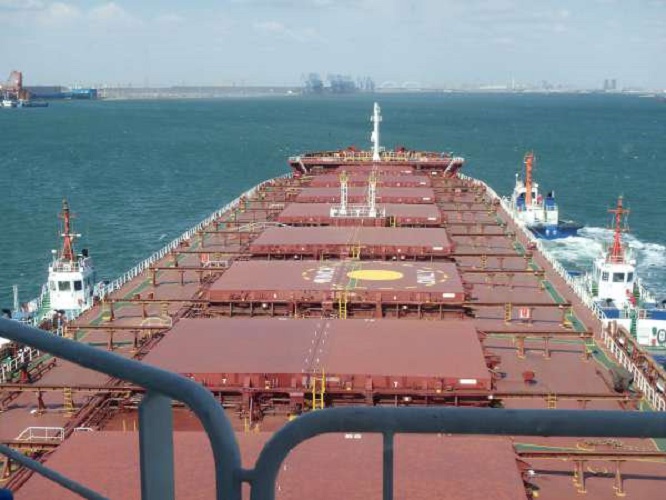Maran Dry Management Inc. has signed a Joint Development Project (JDP) agreement with Class Society RINA and Chinese designer SDARI for a new bulk carrier which will meet IMO 2050 using an innovative fuel solution of LNG and hydrogen produced on demand on board

RINA announces the signing of a JDP with Maran Dry Management Inc. and SDARI for an LNG and hydrogen-powered 210,000DWT bulk carrier. The project will be based on a propulsion arrangement which reduces the running machinery at sea and combines the ship’s fuel (LNG) with steam to produce hydrogen and CO2. The project sees the design, which was launched earlier this year for an MR tanker, in its first application for a bulk carrier.
“Maran Dry Management is committed to embracing the energy transition and working towards net zero shipping solutions”, comments Captain Babis Kouvakas, Managing Director at Maran Dry Management (MDM) Inc. “Working with RINA and SDARI, this JDP agreement will give us a highly competitive bulk carrier design that will exceed IMO’s current 2050 targets and ultimately get to near-zero emissions. The project demonstrates our strong commitment and active role in the decarbonisation goals set by IMO, providing a pioneering concept, unique to the bulk carriers segment (newcastlemax) and the shipping industry as a whole, setting a leading example to exceed the current and projected emissions reduction targets, while demonstrating an innovative sustainable path for the future of shipping. The design will allow us to run the vessel on increasing percentages of hydrogen, lowering emissions over time, to meet the increasingly stringent rating thresholds towards 2050.”
Paolo Moretti, CEO at RINA Services, says, “The concept was conceived to be used on a wide range of vessel sizes. We have already approved its feasibility on a MR tanker, this joint development project will show how a Newcastlemax bulk carrier design can benefit from the LNG and hydrogen solution. We are privileged and very happy to be working with Maran Dry Management and SDARI, supporting their pioneering point of view on decarbonisation.”
Mr.Wang GangYi, Chief Engineer at SDARI, adds, “This is an exciting design that enables shipowners to work towards IMO 2050 with confidence, as it does not rely on the availability of new fuels or additional technological developments to maintain the ship’s A rating going forward. We too are delighted to be working with a company such as Maran Dry Management and RINA and hope this will be the start of a long and mutually beneficial relationship.”
The design is based on a pre-combustion carbon capture principle: the CO2 is captured from splitting the LNG molecules before the combustion in the engine takes place, rather than from exhaust gas emissions. This involves lower mass flows, therefore a reduced space required, and scalable installation to progressively keep up with the pace of the emissions reduction requirements up to 2050. The vessel can be built as an ordinary dual fuel ship, and the extra equipment installed once regulations incentivize the investment.
The solution addresses existing LNG bunkering facilities and requires no onshore hydrogen infrastructure and no need for supply and storage of hydrogen on board. It will also aim to reduce the resistance of the ship to increase overall operational efficiency.
As the Class Society, RINA will review calculation and design drawings submitted by SDARI to ensure they meet the latest statutory and RINA Classification Rules and Regulations, using the experience already gained on this innovative fuel solution.
“This is a practical solution and a practical application. It is great that a pioneering company such as Maran Dry Management is taking on this project, which we hope will be the first of many vessels that adopt this technology to meet decarbonisation targets,” concludes Moretti. “We are very proud to be working with Maran Dry Management on this ground-breaking design.”